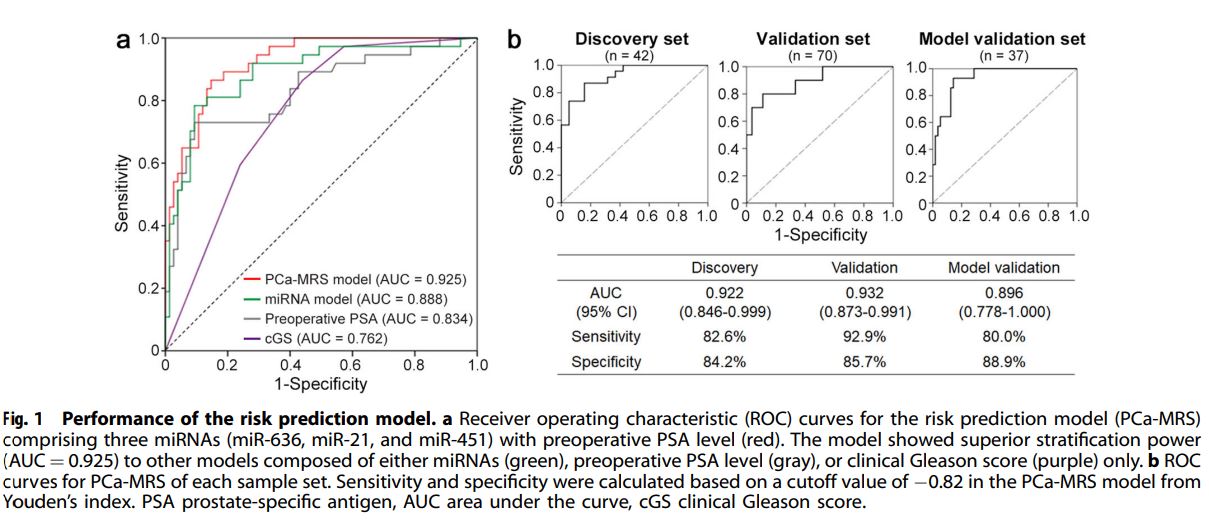Back
Poster, Podium & Video Sessions
Moderated Poster
MP45: Prostate Cancer: Markers
MP45-03: Urinary exosome microRNA signatures as a noninvasive prognostic biomarker for prostate cancer
Sunday, May 15, 2022
1:00 PM – 2:15 PM
Location: Room 225
Hyeok Jae Kwon*, Chang Eil Yoon, Dongho Shin, Sun Shin, Hyong Woo Moon, Hyuk Jin Cho, U-Syn Ha, Sung-Hoo Hong, Ji Youl Lee, Yeun–Jun Chung, Sae Woong Kim, Yong Hyun Park, Seoul, Korea, Republic of
- HK
Hyeok Jae Kwon, MD
The Catholic Univ. Of Korea Seoul St. Mary's Hospital
Poster Presenter(s)
Introduction: The levels of circulating microRNAs (miRNAs) from body fluids can be used as non-invasive prognostic biomarkers in prostate cancer (PCa). This study aimed to assess the utility of urinary exosomal miRNAs as non-invasive prognostic biomarkers for PCa by observing differentially expressed miRNAs between localized and metastatic PCas and exploring their biological implications.
Methods: Forty-two samples from 19 localized and 23 metastatic PCa patients, 70 samples from 56 localized and 14 metastatic PCa patients, and 37 samples from 27 localized and 10 metastatic PCa patients were used as discovery, independent validation of candidate miRNAs, and external model validation sets, respectively. We used a combined dataset from discovery and validation sets for the model construction, and a dataset combining all three sets for the survival analysis. Exosomes were isolated from 5 mL of urine using the ExoQuick-TC exosome precipitation solution. miRNA profiles were examined and validated using the TLDA and TaqMan microRNA Assay.
Results: Urinary exosomal miRNA expression profiles of 149 PCas were determined and the miRNAs associated with metastasis were identified: miR-21, miR-16, miR-142-3p, miR-451, and miR-636. When evaluating clinical factors together, miR-21, miR451, miR-636, and PSA level remained significant in the multivariate analysis. Based on them, we developed a “Prostate Cancer Metastasis Risk Scoring (PCa-MRS)” model. The PCa-MRS showed superior stratification power (AUC =0.925) to preoperative PSA or clinical Gleason score (Figure). Patients with high scores showed significantly poorer biochemical recurrence-free survival than those with low scores (P =6.53×10-10).
Conclusions: Our results showed the potential of urinary exosomal miRNAs as non-invasive markers for predicting metastasis and prognosis in PCa patients.
Source of Funding: This work was supported by grants from National Research Foundation of Korea (2018R1D1A1B07048552, 2017R1E1A1A01074913, and 2019R1A5A2027588).

Methods: Forty-two samples from 19 localized and 23 metastatic PCa patients, 70 samples from 56 localized and 14 metastatic PCa patients, and 37 samples from 27 localized and 10 metastatic PCa patients were used as discovery, independent validation of candidate miRNAs, and external model validation sets, respectively. We used a combined dataset from discovery and validation sets for the model construction, and a dataset combining all three sets for the survival analysis. Exosomes were isolated from 5 mL of urine using the ExoQuick-TC exosome precipitation solution. miRNA profiles were examined and validated using the TLDA and TaqMan microRNA Assay.
Results: Urinary exosomal miRNA expression profiles of 149 PCas were determined and the miRNAs associated with metastasis were identified: miR-21, miR-16, miR-142-3p, miR-451, and miR-636. When evaluating clinical factors together, miR-21, miR451, miR-636, and PSA level remained significant in the multivariate analysis. Based on them, we developed a “Prostate Cancer Metastasis Risk Scoring (PCa-MRS)” model. The PCa-MRS showed superior stratification power (AUC =0.925) to preoperative PSA or clinical Gleason score (Figure). Patients with high scores showed significantly poorer biochemical recurrence-free survival than those with low scores (P =6.53×10-10).
Conclusions: Our results showed the potential of urinary exosomal miRNAs as non-invasive markers for predicting metastasis and prognosis in PCa patients.
Source of Funding: This work was supported by grants from National Research Foundation of Korea (2018R1D1A1B07048552, 2017R1E1A1A01074913, and 2019R1A5A2027588).

.jpg)
.jpg)